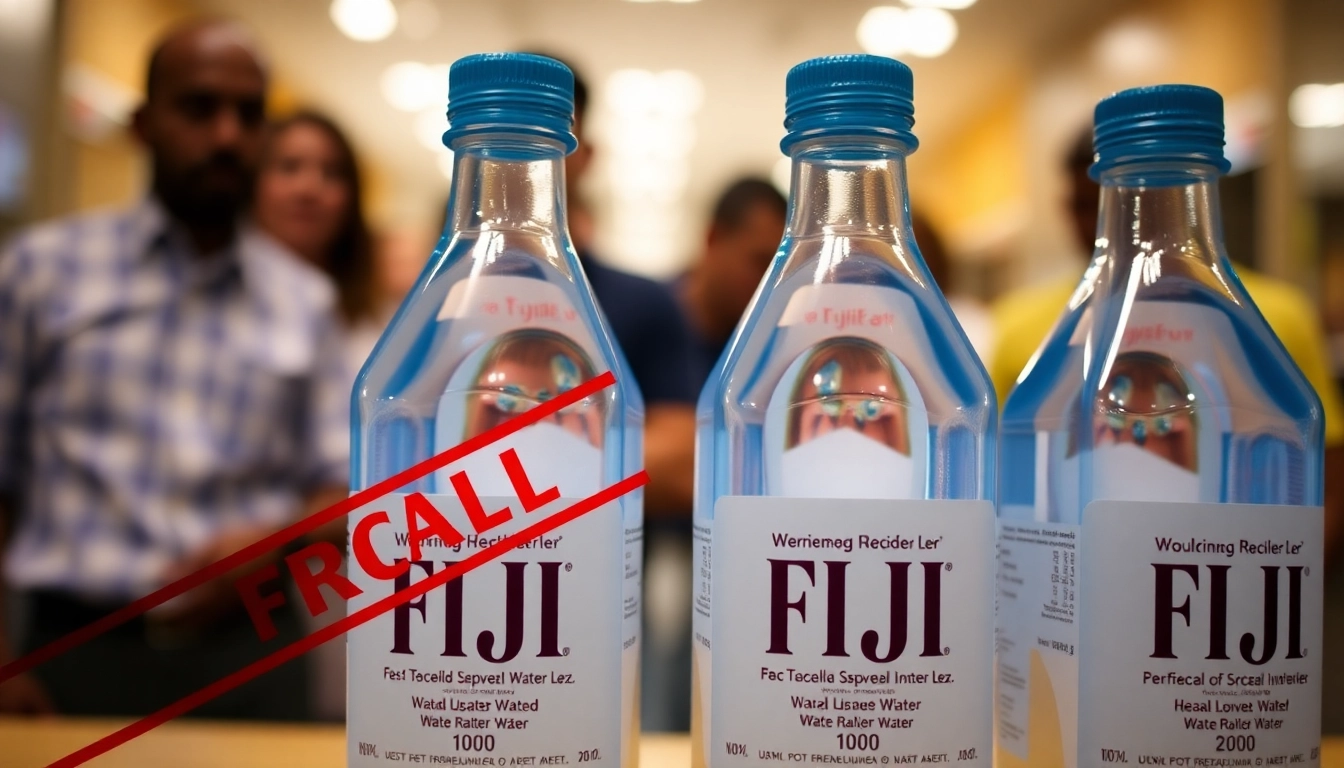Overview of the Fiji Water Recall
In May 2024, a significant development occurred regarding Fiji Natural Artesian Water when the U.S. Food and Drug Administration (FDA) announced a recall affecting 78,533 cases, equivalent to approximately 1.9 million bottles. This recall, classified as a Class III, was triggered over concerns about contamination with manganese and certain bacterial species. Such recalls tend to cause alarm among consumers, raising critical questions regarding the safety and standards of bottled water products, as well as the necessary steps to take when dealing with recalled items. For consumers of Fiji Water, understanding the specific details surrounding the fiji water bottles recalled is essential to ensure health and safety.
What Triggered the Fiji Water Bottles Recall?
The recall stemmed from findings that some batches of Fiji Water had elevated levels of manganese and specific bacteria that could pose health risks. Manganese is a mineral that can be harmful in high concentrations, particularly to infants and young children, leading to neurological issues. Meanwhile, the presence of bacteria, while varying in types and implications, can raise serious concerns about the overall safety of the drinking water. Detailed lab reports indicated potential contamination during one of the bottling or distribution phases, prompting the company to act quickly and voluntarily recall the affected products.
Key Details of the Recall Announcement
On May 23, 2024, the recall was officially announced, specifying that a total of 78,533 cases had been implicated in the contamination issues. Each case typically contains 24 bottles of the 500 mL size, making the total number of affected bottles quite significant. The recall primarily affected products sold online, particularly through major platforms like Amazon.com, which is notable as it highlights the challenges of ensuring quality control across multiple sales channels.
Consumer Alerts Regarding Contaminated Bottles
As part of the recall process, alerts were disseminated through various channels, including social media, official company statements, and FDA notices. Consumer awareness is critical during such times, and the company encouraged buyers to check the batch codes and production details of any Fiji Water bottles they may have purchased. Authorities stressed the importance of promptly disposing of any recalled products, underscoring the overall consumer rights regarding product safety.
Health Risks Associated with Recalled Fiji Water
Understanding the potential health implications stemming from the consumption of contaminated water is paramount for consumers. Risks associated with manganese and bacterial contamination can have varying effects, particularly on vulnerable populations.
Understanding the Dangers of Manganese in Water
Manganese is a naturally occurring element found in various foods and water sources, but when ingested at elevated levels, it can lead to serious health concerns. According to the Minnesota Department of Health, excessive manganese exposure in drinking water can adversely affect children’s development, including their cognitive abilities and behavior. Symptoms of manganese poisoning can include learning difficulties, emotional disturbances, and other neurological effects. It is particularly hazardous for infants, making it crucial for parents to monitor their bottled water consumption.
Potential Health Issues from Bacterial Contamination
Bacterial contamination poses a different set of risks, with the potential for gastrointestinal illnesses and other severe health effects depending on the type of bacteria present. Common pathogens that might be found in contaminated water include E. coli, Salmonella, and Legionella, all of which can lead to significant health complications, particularly for individuals with compromised immune systems. Symptoms can range from mild gastrointestinal upset to more severe infections requiring medical intervention.
What to Do If You Have Recalled Bottles?
Consumers who discover they possess affected Fiji Water bottles should take immediate action. The FDA recommends that these bottles be discarded or returned to the place of purchase. It is advisable to keep records of the purchase for reference, as many retailers will offer refunds or exchanges to uphold consumer trust. Additionally, monitoring for any potential symptoms related to manganese or bacterial exposure, especially in children, is crucial, and consultation with healthcare providers is encouraged if concerns arise.
How to Identify Recalled Fiji Water Bottles
Identifying the exact bottles that are part of a recall is essential for consumers looking to safeguard their health. Several features differentiate recalled products from safe ones.
Packaging and Batch Codes to Look For
Each bottle of Fiji Water typically has identifiable batch codes printed on the packaging. Consumers should look for the production date and batch number, which can generally be found on the neck label or the bottom of the bottle. The affected batch will correlate with the details provided in the FDA’s recall announcement, so it is crucial to confirm these details against official communications from the FDA or Fiji Water.
Where Were the Recalled Bottles Sold?
The majority of the recalled bottles were sold online, primarily through platforms like Amazon, which raised specific safety questions about online purchasing of food and beverage items. Consumers should also check local grocery stores and specialty retailers where they may have purchased Fiji Water, as product distribution can be widespread. Retailers are often asked to pull affected items from shelves following a recall to prevent further distribution.
Identifying Authentic Fiji Bottles Post-Recall
After a recall, consumers may worry that unauthorized or counterfeit products could appear on the market. Authentic Fiji Water bottles can typically be identified by their distinct packaging, labeling, and the brand’s quality assurance credentials. For peace of mind, purchasing directly from reputable retailers or the official Fiji Water site can mitigate risks associated with compromised products.
Consumer Response and Company Actions
The manner in which a company responds to a recall significantly influences public perception and consumer trust. Following the announcement of the recall, Fiji Water took several measures to manage the situation effectively.
Fiji Water’s Statement on the Recall
In the wake of the health concerns, Fiji Water issued a public statement acknowledging the recall and assuring customers of their commitment to quality and safety. The company reiterated its dedication to conducting thorough inspections and stringent quality control measures to prevent future occurrences. Transparent communication is key in managing consumer trust during such incidents.
Actions Taken by Retailers and Market Response
Retailers responded rapidly, pulling affected products from their stores and online listings, demonstrating their vigilance in consumer safety. Many notable retailers reached out to customers through email notifications and posted alerts in-store to help prevent consumption of the recalled products. This proactive stance is crucial in maintaining public safety and trust in the brand.
Public Awareness Campaigns Following the Recall
Post-recall, public awareness campaigns serve to educate consumers on the importance of checking product safety and understanding recalls. Such initiatives often include collaboration between bottled water manufacturers, policy makers, and public health departments to provide guidelines on safe consumption practices and the importance of being informed about ongoing recalls in the food and beverage industry. These campaigns emphasize consumer awareness and lead to increased vigilance in monitoring product safety.
Preventing Future Recalls of Bottled Water
To reduce the risk of further recalls, significant focus must be placed on quality control measures, safety regulations, and consumer education. Understanding the underlying factors that lead to contamination issues can help foster a safer environment for bottled water consumption.
Quality Control and Safety Regulations in Bottled Water
The bottled water industry operates under various regulatory frameworks, yet companies must actively maintain quality standards beyond mere compliance. Regular testing for contaminants, transparent reporting mechanisms, and strict adherence to safety protocols can help prevent potential issues from arising. Implementing a culture of safety that prioritizes consumer health can establish brands as reliable sources for quality products.
Consumer Tips for Safer Bottled Water Choices
Consumers can take proactive steps when selecting bottled water. Checking expiration dates, reviewing packaging for potential recalls, and purchasing from reputable retailers can enhance safety. Additionally, being informed about manufacturers’ quality practices and standards can help consumers feel more confident in their choices.
The Role of FDA in Ensuring Water Safety
The role of the FDA remains central in monitoring bottled water safety in the U.S. Stringent regulations and regular assessments of bottled water products ensure compliance with health guidelines. The FDA conducts inspections and sets quality standards to mitigate risks associated with contaminated water. Encouraging public awareness about the FDA’s role can help consumers appreciate the importance of reporting incidents and participating in safety practices.



